Fallen by death of the brave: the commander of the South-Western Front, General Kirponos
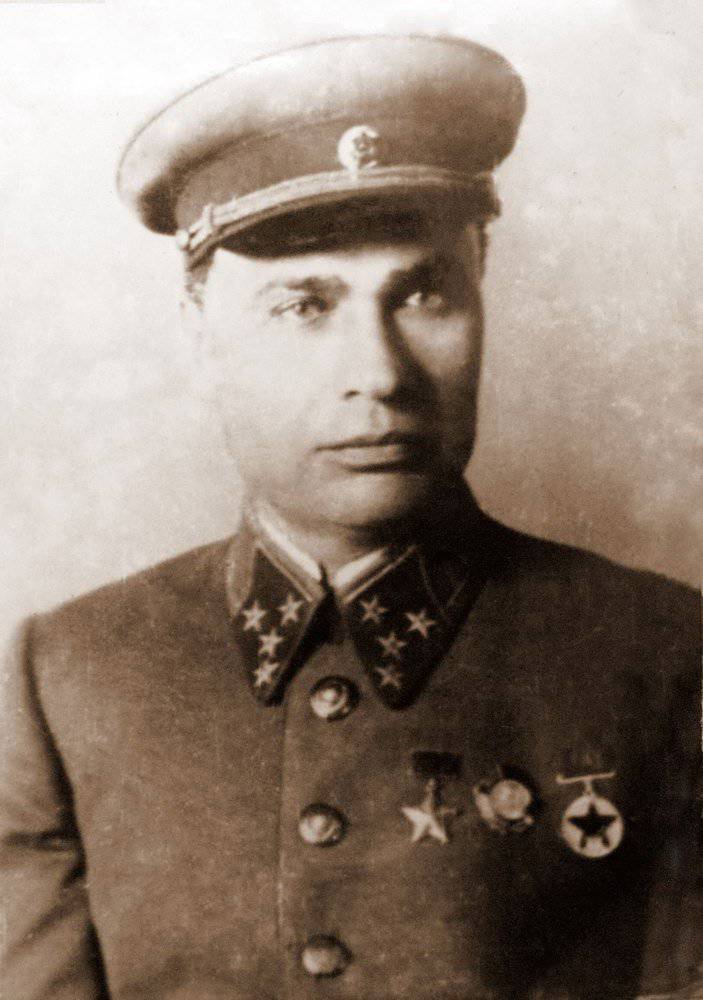
The Kiev Special Military District in the period preceding the beginning of World War II was considered by the High Command as one of the key military districts of the country. The Kiev military district was created on May 17 of the year 1935 - as a result of the division of the Ukrainian military district into the Kiev and Kharkov military districts. In 1938, it was decided to transform the Kiev Military District into the Kiev Special Military District (hereinafter - KOVO). In the western direction, its role was decisive, since it covered the strategically important territory of the Ukrainian SSR. By 1941, it covered Kiev, Vinnitsa, Zhytomyr, Kamenetz-Podolsk, Stanislav, Ternopil, Chernivtsi, Rivne, Volyn, Lviv and Drohobych regions of the Ukrainian SSR.
The district was border, and this determined its strategic importance for the defense of the Soviet state. The largest grouping of Soviet troops in the western direction was stationed on the territory of the district. Naturally, a worthy and credible man should have commanded such an important district. Since the formation of the Kiev Special Military District, the post of commander has been occupied by such renowned Soviet commanders as commander of the 2 rank Semen Konstantinovich Timoshenko (in 1938-1940) and Army General Georgy Zhukov (1940-1941).
28 February 1941, George Zhukov, who became the winner of two major military games, worked out the Soviet offensive in the western direction and, accordingly, the defense in the western direction, was nominated by Joseph Stalin for the post of Chief of the General Staff of the Red Army. There was a question of who would replace Georgy Konstantinovich as commander of the Kiev Special Military District. It should have been a no less worthy and talented military leader. Ultimately, Stalin chose Lieutenant-General Mikhail Petrovich Kirponose. A forty-nine-year-old Lieutenant-General Kirponos, before being appointed commander of the Kiev Special Military District, commanded the Leningrad Military District. He was a military leader with great combat experience, who received the title of Hero of the Soviet Union during the Soviet-Finnish war.
From peasant son to red commander
Like many Soviet military leaders, Mikhail Petrovich Kirponos was, as they say, a man of the people. He was born on January 22 (January 9 old style) 1892, in the town of Vertievka, Nezhinsky district, Chernihiv province, in a poor peasant family. His education was reduced in adolescence to the year of the parish and three years Zemsky school. Since the family had not so many funds, they had to stop their studies and, like many of their peers from the village, go to work. Since 1909, Kirponos worked as a watchman, a forester in the forest areas of the Chernigov province. In 1911, he married the saddler’s daughter Olympiad Polyakova (he later divorced her in 1919, leaving behind two daughters and married Sofya Piotrovskaya in the same year, 1919). When World War I began, Mikhail Kirponos was already 22 of the year.
In 1915, a young man was called up for military service. He graduated from instructor courses at the Oranienbaum officer rifle school, after which he was assigned to the 216 reserve infantry regiment stationed in Kozlov (now the city of Michurinsk in the Tambov region). In 1917, the town of Kirponos replaced the military specialty - he graduated from the military medical assistant school, and in August of the same year he was sent to the Romanian front as part of the 258 Olgopol Infantry Regiment. Mikhail Kirponos, 25, becomes chairman of the soldiers 'regimental committee, and in November of the same year becomes chairman of the soldiers' council of the 26 Army Corps.
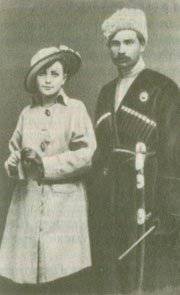
Apparently, during these years young Kirponos not only sympathized with the revolutionary movement, but also tried to take an active part in it. So, he organized fraternization with Austro-Hungarian soldiers, for which he was arrested and in February 1918 was demobilized from the Russian army. Then he became a member of the Russian Communist Party (Bolsheviks). Returning to his homeland, where German and Austro-Hungarian troops were in charge, Mikhail Kirponos joined the partisan struggle and created a small detachment that fought both against the Germans and the Austrians, and against the forces of the Central Council. Joining 1918 in August to the Red Army, Kirponos almost immediately (next month in September), as an experienced soldier, was appointed company commander for the 1-th Soviet Ukrainian Rifle Division. The division, by the way, was commanded by the legendary divisional commander Nikolai Shchors.
In the Red Army, Kirponos’s career went swiftly - in December, two months before that, having commanded a company, he became the battalion commander, and then the chief of staff and commander of the 22 Ukrainian Infantry Regiment as part of the 44 Infantry Division. In this capacity, the regiment commander Kirponos took part in the battles for the capture of Berdichev, Zhytomyr and Kiev. In July, 1919 received a new appointment as an assistant to the chief of the divisional school of senior officers (red commanders) of the same 44 rifle division. Here begins the temporary decline of Kirponos, apparently related to his lack of military education. So, in May 1920, he became an assistant to the head of the 2 economic team of the Kiev school of senior officers, and in June, 1921, a year later, became the head of the economic part, then an assistant commissioner of the same school. In 1922, the town of Kirponos graduated from the 2 Kiev School of Hearts, thus receiving a military education without leaving the service at the school.
After receiving military education, Kirponos continued to serve in the Kharkov school of senior officers (October 1922 - September 1923) for a year, where he held the position of assistant chief in political affairs. This was followed by studies at the Military Academy of the Red Army. Mv Frunze, which Kirponos graduated from in 1927 and was distributed by the battalion commander to the 130 th Bogunsky infantry regiment. However, as early as December 1928, he again returned to the system of military schools - this time as an assistant chief - the head of the training unit of the Kharkov military school of the foremen. VCIK. From April 1929 to March 1934 Kirponos served in the 51 of the Perekop rifle division - first, until January 1931, as an assistant and then as chief of staff of the division.
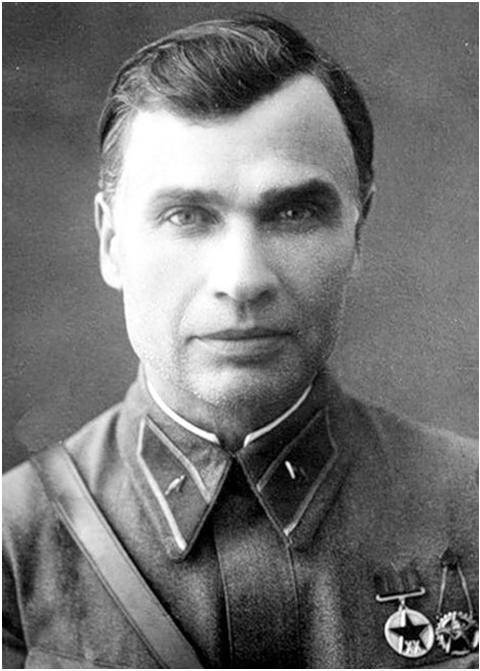
In March, 1934 Mr. Mikhail Kirponos was appointed head and military commissar of the Tatar-Bashkir United Military School. CEC Tatar ASSR. Kirponos led this military school for more than five years - from March 1934 to December 1939. During this time, the school underwent several renames - in December, 1935 was renamed Tatar-Bashkir Military Infantry School named after the CEC of the Tatar Autonomous Soviet Socialist Republic, in April 1936 - in Kazan Infantry School. CEC of the Tatar Autonomous Soviet Socialist Republic, in March 1937 - in the Kazan Infantry Military School. CEC Tatar ASSR and, finally, in March 1939, in the Kazan Infantry School. Supreme Council of the Tatar Autonomous Soviet Socialist Republic. Since March 1937, the military school has become all-union and young people from all the Union republics of the USSR have been able to enter it. During the five years that Kazan School was led by Kirponos, many worthy commanders received training and were sent to the troops, some of them were awarded high awards, including the title of Hero of the Soviet Union. Kirponos himself during the management of the school and college has grown in ranks. 26 October 1935 g. He was awarded the title of kombriga, and after four years, 4 November 1939 g. - The title of divisional division.
The cadets of the school recalled Kirponos as an excellent commander and educator - military pedagogical activity was his real vocation. In addition, Kirponos, being the head of the school, was also involved in administrative work, because at that time, organizing the normal supply of the school was also quite difficult and, at the same time, very necessary. Party-political activity remained the most important for Kirponos - from the time of the end of the First World War, when he was elected chairman of the regimental soldier’s committee, Kirponos was actively engaged in social activities. A convinced Communist, he took an active part in all party meetings of the school and college. Naturally, in the spirit of the time he had to participate in the exposure of "enemies of the people." At the same time, it should be noted that Kirponos always, what is said, “knew the measure” - where there were real oppositionists to the Soviet course, and where by chance suspected people. For some cadets, commanders and teachers of the school, he played the role of advocate. The fact that Kirponos was an active communist and unequivocally supported the Stalinist policy, of course, also played a role in his subsequent rapid military career. In particular, if we consider that at the end of 1930's. many commanders of the Red Army were repressed and their posts required to be replaced by someone.
Soviet-Finnish War and Growth
In the meantime, the military-political situation on the Soviet borders has become significantly aggravated. In the north-western direction, the Soviet Union came into conflict with Finland. 28 November 1939 was denounced the Non-Aggression Pact, and 30 November 1939 Soviet troops stationed on the Soviet-Finnish border were ordered to go on the offensive. The official reason for the outbreak of hostilities was the shelling of Soviet territory from the territory of Finland. An impressive Soviet group of troops was concentrated against Finland as part of the 7, 8, 9 and 14 armies. From the first days of the beginning of the war, the need for literate and talented commanders began to be felt, in connection with which the USSR Defense Commissariat turned to the practice of transferring top commanders from other military units and military schools to the army. In December, the division commander Mikhail Kirponos, head of the Kazan Infantry School at that time, received a new assignment — commander of the 1939 Infantry Division, which was part of the 70 Army of the Red Army. Thus, the head of the school, who actually did not have, apart from short-term participation in the Civil War, the actual experience of commanding military units, was given high confidence and, as it were, opened up opportunities for further advancement of the career ladder in the event of a successful command of the entrusted infantry division.
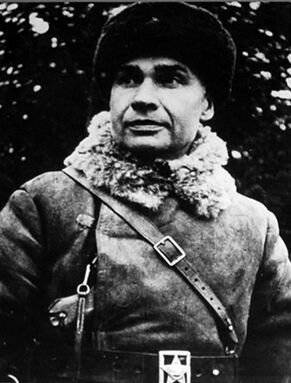
The Seventh Army was concentrated on the Karelian Isthmus. By November 1939, its structure included, in addition to the army headquarters, the 19th and 50th rifle corps and in their composition the 24th, 43rd, 49th, 70th, 90th, 123rd , 138th, 142nd and 150th Infantry Divisions, three tank brigades, six artillery regiments of the RGK, three artillery battalions of high power RGK. The Army Air Force included the 1st and 68th Light Bomber, 16th High-Speed Bomber, and 59th Fighter aviation brigades consisting of 12 aviation regiments and 644 aircraft.
The 70th Infantry Division, which was to command the divisional division Kirponos, was part of the 19 Infantry Corps of the 7 Army and included three rifle regiments (68, 252 and 329), two artillery regiments (221 Light Artillery Regiment and 227 th Howitzer Artillery Regiment), 361 Tank Battalion, 204 Chemical Tank Battalion. In February, 1940 was included in the division 28-th tank regiment on the T-26. 30 November 1939 The division entered the territory of Finland. The division of Kirponos, which received 25 on December 1939, replaced its previous commander, Colonel Fedor Aleksandrovich Prokhorov. To the credit of the latter, it can be said that he prepared his fighters well and the division was considered one of the best in the army in the field. Under the command of Kirponos, she 11 February 1940 began to participate in the breakthrough of the famous "Mannerheim Line". From 11 to 14 in February, divisions of the division occupied part of the field fortifications of the Karhul district, in February 17 participated in the “battle for the islands”, and in February 21-23 in the seizure of the island of Liisaari (North Birch). February 26 from the 19 Infantry Corps division was transferred to the 10 Infantry Corps. Her fighters managed to occupy part of the Koivisto Peninsula (Kiperort), the islands of Pukinsaari (Kozliniy) and Hannukkalansaari (May).
February 29 division was transferred to the 28 th infantry corps, in which participated in the battles for the city of Trongzund (Vysotsk), then - for the island Ravansaari (Small Vysotsky). The most famous feat of the division was crossing the ice of Vyborg Bay at night. Having completed a six-day raid to the rear of the enemy, in March 1940, the division occupied a bridgehead on the northern shore of the bay and took control of the Vyborg-Hamina road. This throw of the division played a crucial role in the storming of Vyborg, which could not be ignored by the higher command. The division was awarded the Order of Lenin, and the 252 th infantry and 227 th howitzer artillery regiments were awarded the Orders of the Red Banner. Division commander Mikhail Petrovich Kirponos 21 March 1940, was awarded the high title of Hero of the Soviet Union and received the Order of Lenin and the Gold Star medal.
The successful command of the 70 Infantry Division, which showed its valor and combat training in the Soviet-Finnish war, became the “high point” of the division commander Kirponos in the literal and figurative sense. It is from this time begins his rapid, but, unfortunately, short-term, climbing the steps of the command posts of the Red Army. Prior to this, Kirponos led a military school for five years, and during the next four years he increased only by one rank. But the feat 70 th Infantry Division contributed to the fact that the divisional commander noticed. In April 1940 of the year, a month after the forcing of Vyborsk Bay, Mikhail Kirponos was appointed commander of the 49 Infantry Corps, which was part of the Kiev Special Military District. However, already in June of the same year, two months after being appointed corps commander, Kirponos was waiting for the next huge increase - he was appointed commander of the Leningrad Military District. 4 June 1940 Mr. Mikhail Petrovich Kirponos was given the military rank of “Lieutenant-General” (in connection with the introduction of the general ranks in the Red Army).
Kiev Special Military District
However, Mikhail Kirponos also served a short time as commander of the Leningrad Military District. As early as February 1941, less than a year after his appointment to the LVO, Kirponos was appointed commander of the Kiev Special Military District. 22 February 1941 Mr. Mikhail Petrovich Kirponos was awarded the next military rank of "Colonel General". The appointment of the Kiev Special Military District shows that the High Command trusted Mikhail Kirponos and, apparently, it was after his successful leadership of the 70 Infantry Division during the Soviet-Finnish war that he saw him as a promising commander capable of well-prepared troops of the strategically important district and effectively command them.
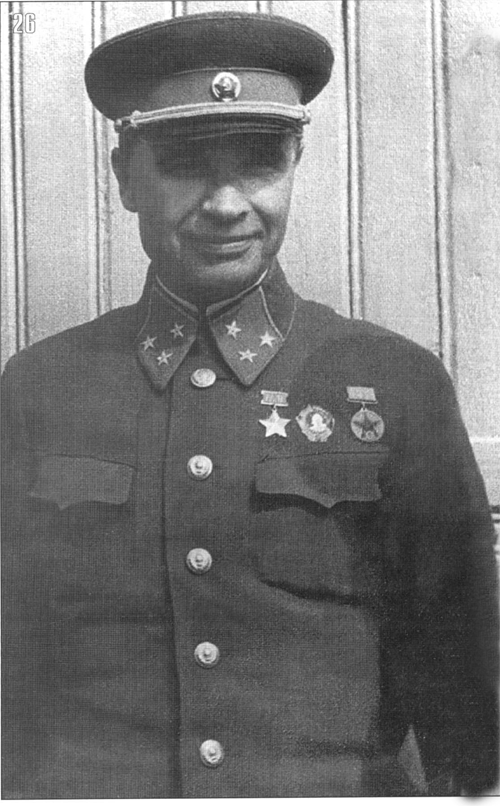
Apparently, Stalin, appointing Kirponos as commander of the most important military district in the defense system of the western direction, hoped that Kirponos would be able to prepare the district for the impending war, without arousing suspicion from the enemy. After all, Kirponos in the years of the Civil War had a rich experience of participating in the partisan movement - first commanding his own insurgent detachment, and then service in the Shchors division. The command of the partisan formation requires the creativity of thinking, versatility, the ability to make decisions independently, which sometimes lacks the commanders of the regular army units. Moreover, Kirponos had to combine not only military and political leadership, but also the functions of an administrator and supplier. In general, it should be noted that there was no mistake in choosing Kirponos for the post of commander of the district - the colonel-general in fact matched his hopes for his personal and professional qualities. Although, nevertheless, there was one flaw in the new commander - the experience of the command of the operating combat units that was too small in time.
In fact, if you do not take into account the time of participation in the Civil War in the Shchors division, and later in the Soviet-Finnish war, most of the military service of Mikhail Petrovich fell on military-pedagogical activity - he held various positions in military schools. Army General Georgy Zhukov, from whom Kirponos assumed command of the Kiev Special Military District, also drew attention to this shortcoming: “I was glad that the Kiev Special Military District was given to such a worthy commander. Of course, he, like many others, did not yet have the necessary knowledge and experience to lead such a large border region, but life experience, hard work and natural witness ensured that a first-class commander of the troops would be developed from Mikhail Petrovich (Quoted from: Meretskov KA. In the service of the people. SPb., 2003). That is, despite the lack of experience, Zhukov, nevertheless, recognized Kirponos as a promising commander and was convinced that the colonel general would be able to fully disclose his leadership talent, having penetrated into the nuances of the district command.
Ivan Khristoforovich Bagramyan, while serving as a colonel, served as chief of operations, deputy chief of staff of the Kiev Special Military District, recalls the appointment of Kirponos as commander of the district: “Soon after his arrival, the new commander went around headquarters. Apparently, he wanted to quickly get acquainted with the situation, with people. He visited us in the operations department. His lean, well-fitting figure was tightly wrapped in a carefully ironed tunic. On the chest glittered golden star of the Hero. Pale, smoothly shaved face with almost no wrinkles. Black eyebrows hung over large blue eyes. Dark, thick hair is carefully combed into the middle. Only light gray hair on the temples and deep folds in the corners of the lips showed that this youthful man was under fifty ”(quoted in Bagramyan I.Kh. So the war began. M. 1971).
The commander Kirponos paid much attention to the questions of combat training of troops. Understanding perfectly, the most likely opponent of the Soviet Union is Germany, the command of the Red Army paid great attention to the training of military units and formations of the Kiev Special Military District. First of all, the task was to work out actions in the event of an enemy tank attack. On the other hand, emphasis was placed on improving the preparation of their own tank units. Thus, the most frequent guest was that the commander of the district, Colonel General Kirponos, was in mechanized corps, where he tested the ability of crews to control tanks, and tank units to act cohesively in combat.
In addition to combat training, the most important activity of the troops of the Kiev Special Military District remained the construction and equipment of fortifications in the border areas. However, despite all the efforts of the commander, the district experienced a lot of problems characteristic of the entire Red Army in the prewar period. First of all, we are talking about weak armament and lack of personnel in units and formations. According to the memoirs of I.Kh. Bagramyan, only in the Kiev Special Military District didn’t have enough 30 thousands of servicemen. And this was despite the fact that military schools were transferred from a three-year to a two-year study period, and junior lieutenant courses were created for accelerated training of commanders. As for the provision of troops with weapons and equipment, there was widespread lack of weapons, communications and special equipment, vehicles. It didn’t seem possible to fill all this overnight - the national economy of the country and so worked to the limit.
War
22 June 1941 Hitler’s Germany and its satellites attacked the Soviet Union. Among the first, the military units and formations that were part of the Kiev Special Military District received their blow. On the day the war began, the Kiev Special Military District was transformed into the South-Western Front. Colonel-General Mikhail Kirponos was appointed commander of the South-Western Front. The troops of the South-Western Front numbered 957 thousands of soldiers and officers. The district was armed with 12,6 thousand artillery guns and mortars, 4783 tank and 1759 aircraft. Against the South-Western Front, Hitler’s Army Group South was concentrated in 730 thousands of soldiers and officers, 9,7 thousands of artillery guns and mortars, 799 tanks and 772 aircraft. That is, at first glance, the Soviet troops had a significant superiority not only in manpower, but also in armament. However, in reality, the situation looked different. First, almost immediately after the start of the war, Army Group South was reinforced by 19 divisions, and was also joined by Hungarian, Romanian, Italian, and Slovak troops. The southwestern front did not receive reinforcements in such numbers, and the state of its technical fleet, although at first glance superior to German in numbers of tanks, aircraft and artillery, left much to be desired. Secondly, only a few Soviet divisions were stationed in close proximity to the border, while the enemy hit all at once with the "fist" of Army Group "South", securing numerical superiority over Soviet troops in the border area and leveling the capabilities of the Southwestern Front troops for more the later stages of the hostilities, since they entered the hostilities alternately and, accordingly, could not use their advantages to a larger number of personnel.
The headquarters of the Supreme Commander 22 on June 1941 ordered Colonel General Kirponos to order Soviet forces to counter-attack the 5 and 6 armies and take Lublin. By itself, this task was difficult, but Kirponos had nothing to do but try to accomplish it. In the command of the front there were opposite points of view. Corps Commissar Nikolai Nikolayevich Vashugin, a member of the Military Council of the Front, spoke in favor of the immediate execution of the order of the Supreme Commander’s Headquarters on the offensive. Lieutenant-General Maxim Alekseevich Purkaev, chief of staff of the front, adhered to the opposite position. He understood that the front forces simply would not have time to concentrate for delivering a retaliatory strike and offered to organize defense, holding the enemy back for as long as possible in order to create fortified areas in the inner territories of the district.
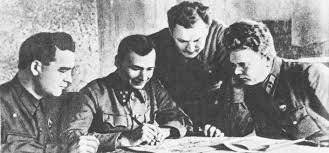
Mikhail Petrovich Kirponos came up with a slightly different idea - he proposed to strike at the base of the German grouping aimed at Kiev by the forces of three mechanized corps and rifle divisions of the 5 and 6 army. The task of the counterattack would be the complete destruction of the enemy’s avant-garde and maximum containment of the 1 tank army commanded by General Ewald von Kleist (the tank army included five Wehrmacht tank divisions). However, the offensive strike of the Soviet troops was unsuccessful. There was no interaction between the mechanized corps. Organizational failures led to the depletion of the resource part of the old armored vehicles, which were mainly equipped with mechanized corps of the front. Finally, the 34-I tank division was surrounded and was able to break through to its own, only after losing all its tanks. Speaking about the reasons for organizational failures, P.V. Burkin draws attention to the lack of practical experience of General Kirponos in the management of large military units. After all, as a matter of fact, before becoming the commander of the district, he commanded only a rifle division, which, moreover, did not have tank divisions. Accordingly, Kirponos had no experience in organizing the interaction of mechanized compounds (See: P. Burkin. General Kirponos: Experience of Historical and Anthropological Research).
However, to a certain extent, the troops of the South-Western Front still managed to significantly impede the enemy's advancement towards Kiev. Although the counteroffensive plan failed, but Soviet troops stopped the units of the Wehrmacht in 20 km. west of Kiev. This forced the Nazis to change the tactics of the offensive. The Wehrmacht command temporarily refused to storm Kiev and sent all forces to the left flank of the front. The enemy pushed the 6 and 12 Soviet armies to the south of Ukraine, gradually cutting them off from the main forces of the South-Western Front. In the area of Tarashchi the retaliatory offensive of the 26 Army was conceived, but in the end it was stopped by the enemy. The Wehrmacht threw the 26 Army to the northeast, after which the position of the South-Western Front deteriorated further. Connections of the enemy came close to Kiev. The High Command demanded the immediate retention of the capital of Soviet Ukraine. 8 August Kirponos organized a counterattack on enemy positions, throwing at him all the forces at his disposal — 175, 147-rifle divisions that participated in the defense of Kiev, reserve 206 and 284-th, 2 and 6- airborne brigade. On August 9, the 5 I Airborne Brigade and the Kiev Militia joined the battle. As a result, the Wehrmacht began a gradual retreat from Kiev. By August 16, the enemy was pushed back to the initial positions by the heroic efforts of the Soviet troops. The defense of Kiev played a crucial role in the first stage of the Great Patriotic War, significantly slowing the advance of enemy troops into Soviet territory and forcing the Hitlerite command to change the trajectory of the main forces of the Wehrmacht. Thus, for a whole month, which in the conditions of the war was of very great importance, the nazi offensive was delayed towards Moscow.
Since the Nazi troops were redirected from Moscow to the southern direction, the main task was to retreat from near Kiev. Kirponos himself and Marshals Budyonny and Shaposhnikov insisted on this. However, Stalin did not give permission for the withdrawal of troops. As a result, by September 14, the 5, 21, 26, and 37 armies were surrounded. Tens of thousands of Soviet soldiers died in the environment or when trying to break through. The troops of the South-Western Front were divided and surrounded by the enemy. September 20 to the Dryukovshchina farm, which is in 15 km. south-west of Lokhvitsy, the headquarters of the South-Western Front and the 5 Army came with escort forces. Here they were attacked by units of the Hitlerite 3 Panzer Division. The commander of the artillery of the 5 Army, Major General Sotensky, and his staff officers were captured. The total strength of the staff column at this point was about a thousand people, including about 800 commanders - generals and staff officers, as well as a commandant company.
The column retreated to the Shumeikovo grove. The front commander himself was General Kirponos, Tupikov, the chief of the front headquarters, Burmistenko and Rykov, members of the Front Military Council, Potapov, commander of the 5 army, and other top commanders of the front. Parts of the Wehrmacht attacked the Shumeikovo grove in three directions. The fight lasted five hours. Colonel-General Mikhail Kirponos was wounded in the leg, then fragments of a mine fell into his chest, which caused him to die. Subordinates buried the front commander here, in the grove. The chief-of-staff Tupikov, a member of the Military Council Burmistenko, and many other commanders were also killed in the battle. The commander of the 5 Army, General Potapov, was captured.
In December 1943, the remains of Colonel-General Hero of the Soviet Union Mikhail Petrovich Kirponos were reburied in Kiev in the Botanical Gardens of them. A.V. Fomina, and in 1957 g. - moved to the Park of Eternal Glory. General Kirponos did not fully succeed in uncovering his talent, of course, present. He died at the very beginning of the war, finding its most tragic moments - the retreat of the Soviet troops, the occupation of a large part of the territory of Soviet Ukraine. Nevertheless, it is safe to say that General Kirponos made a huge contribution to the defense of the country against the aggression of Hitler's Germany. Having detained the German troops near Kiev, he postponed the attack on Moscow, giving the opportunity to consolidate the forces of the Red Army to protect the Soviet capital. Despite all the mistakes and miscalculations in the leadership of the troops, which are paid attention to by many modern historians, General Kirponos passed his way of the Soviet soldier with honor and died on the battlefield, in battle, not surrendering to the enemy. It only remains to conclude the article with the words from Marshal of the Soviet Union Kirill Semenovich Moskalenko about Colonel-General Kirponos: “He was a brave man militarily and showed himself a brave and strong-willed commander ... a brave, courageous general died in the days of difficult trials, leaving behind Good and bright memory in the hearts of those who knew him ... ”(Moskalenko K.S. In the southwestern direction. M., 1975).
Information